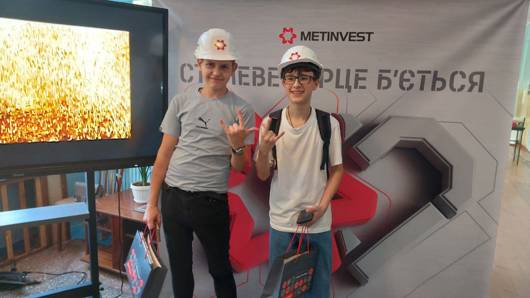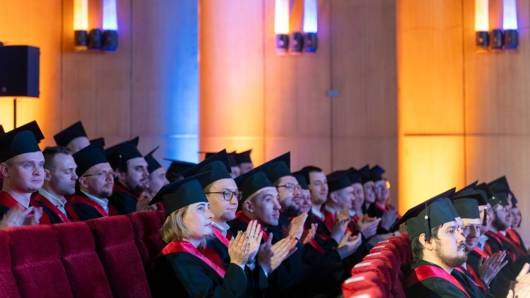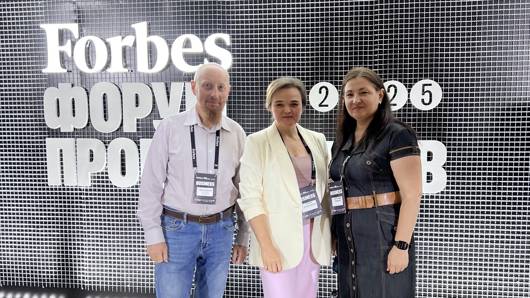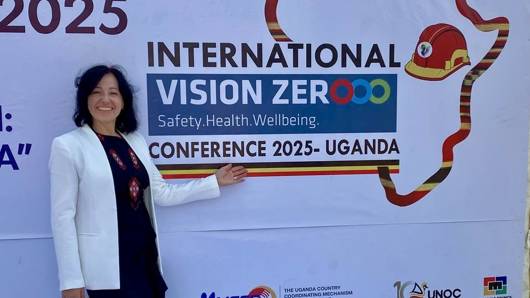The October-November 2025 issue of Forbes Ukraine features a story about how Metinvest Polytechnic is cultivating a new generation of engineers, metallurgists, miners and modernisation leaders, to drive the future of Ukrainian industry and support the country’s reconstruction.
Inspired by one of Asia’s leading technical universities, Metinvest Group founded Metinvest Polytechnic five years ago.
In the summer of 2021, construction began in Mariupol on a cutting-edge university campus, complete with student accommodation and a sports complex. The project was well under way when the full-scale war forced its suspension.
However, the pause was not permanent. Following the temporary occupation of Mariupol, the university retained its academic and teaching staff. It has continued operations in a hybrid online and offline format. In the autumn of 2022, Metinvest Polytechnic welcomed its first intake of more than 440 students to its bachelor’s and master’s degree programmes.
Metinvest Polytechnic currently operates in Zaporizhzhia, Kryvyi Rih and Kamianske, combining online lectures with practical training at Metinvest’s production sites. More than 260 master’s graduates have already received their diplomas and are building careers in Ukraine’s industrial sector. The university is a strategic asset for Metinvest Group, bringing together fundamental education, science and practical experience.
How does the university shape a new generation of engineers and contribute to improving industrial efficiency?
About the mission
Metinvest Polytechnic, Ukraine’s first private mining and metallurgical university, is an example of effective integration of big business into engineering education. The Group not only invests but is also actively involved in the learning process. The university is focused on practical outcomes, training professionals who can work in production, modernise industry and contribute to the country’s reconstruction from day one.
“We aim to cultivate Ukraine’s engineering elite,” says Tetiana PETRUK, chief sustainability officer at Metinvest Group. “The university is designed to become a hub for training specialists capable of transforming industry through decarbonisation, digitalisation and environmental innovation.”
The educational process is closely integrated with production. The Group’s leading engineers and managers act as mentors to students. They also contribute to the development and improvement of educational programmes, business cases and practical assignments. Their efforts help to ensure a strong connection between theory and real industrial challenges. The Group’s top executives serve on the university’s supervisory board, while the institution trains specialists to support enterprise growth. Currently, Metinvest Group has around 4,000 open positions.
Combining European education with the needs of industry, Metinvest Polytechnic prepares students not only as skilled professionals but also as future innovators. “We foster leadership qualities and initiative,” emphasises the university’s rector, Oleksandr POVAZHNYI.
Educational programmes
The university’s programmes are licensed by the Ministry of Education and Science of Ukraine. They are also undergoing accreditation and certification by the National Agency for Higher Education Quality Assurance.
The university’s academic team includes more than 140 lecturers, 92% of whom hold academic degrees (according to Metinvest’s press service). A flexible study schedule enables students to combine work with their chosen educational programme.
Key training areas include metallurgy, mining, engineering, IT and digital intelligence, intelligent control systems, robotics, electrical power engineering, occupational safety and metallurgical modernisation management. “We continuously refine our programmes and develop new ones in close cooperation with the Group,” explains Povazhnyi. “Adaptability to technological and market changes is our top priority.”
By training specialists capable of improving business efficiency, Metinvest Polytechnic became the first Ukrainian university to join Vision Zero, a global initiative that aims to achieve zero workplace injuries. “The principles of safety and responsibility are integrated into all our educational programmes,” says Petruk. “This approach fosters proactive thinking and readiness to make decisions that protect people, resources and corporate reputation.”
The university is currently licensed to offer four levels of education: junior bachelor’s, bachelor’s, master’s and postgraduate degrees. “Anyone can enrol at the university,” explains Povazhnyi. “Students can study on a contract basis or at the Group’s expense if they work at Metinvest enterprises. High-achieving students receive scholarships of up to UAH10,000.”
Practice first
From the very first day, students are immersed in real production tasks at the Zaporizhstal and Kamet Steel plants, as well as at the mining and processing facilities in Kryvyi Rih. “They work on real projects, take part in hackathons, complete internships and often receive career offers while still studying,” emphasises Povazhnyi.
Modern technologies are a key element of the educational process: students work with digital platforms, simulators and laboratories, and have access to global libraries and specialised software. “Collaboration with Microsoft, Schneider, Siemens, AutoCAD, MathCAD, Neural Designer, K-Mine and Matlab enables them to use the same tools that are applied in real industrial settings,” adds Povazhnyi.
The university also organises international internships. “Last year, an internship programme was launched at Metinvest’s enterprises in Bulgaria, and trips to the UK are planned soon. An agreement has already been signed with the Italian company Danieli, a global leader in steelmaking equipment. In the summer, the first students completed a month-long internship at Danieli’s production facilities in Italy and Austria. The university also maintains a broad network of partnerships with both Ukrainian and international universities,” emphasises Petruk.
Support for veterans
Among the students studying at the university are 52 veterans – including Metinvest employees and defenders of Mariupol – who enrolled thanks to a partnership with the Heart of Azovstal NGO.
Veterans can enrol through a simplified procedure, without entrance exams, based on an online interview. “We also organise additional English courses, professional workshops and mentoring sessions to help them quickly integrate into the professional environment,” says Povazhnyi.
Volodymyr TYSCHENKO, a student at Metinvest Polytechnic, defended Ukraine in the Donetsk, Zaporizhzhia and Kherson sectors. He was wounded near Krynky in the Kherson region, after which he was demobilised and returned to work at the Zaporizhstal steelworks. “I chose the ferrous metallurgy programme and am studying free of charge,” says Tyschenko. “This support will help me work more effectively and contribute to the development of both the enterprise and the industry.”
Metinvest Polytechnic aims not only to provide education, but also to create career pathways for veterans, equipping them with skills that are immediately valuable for industrial and business projects.
New horizons
This year, Metinvest Polytechnic celebrated its fifth anniversary. The focus is on launching new programmes in digital technologies, environmental engineering and energy efficiency, as well as training engineers to contribute to Ukraine’s reconstruction. “We place particular emphasis on integrating AI, robotics, automation and digital modelling,” says Povazhnyi.
Metinvest Polytechnic has also become an educational partner of the global School of Community Restoration project, implemented by the Association of Ukrainian Cities and the Mariupol. Reborn NGO. The initiative is aimed at preparing specialists for the country’s recovery.
University lecturers and researchers have developed and implemented training programmes based on their own educational modules for 25 teams from different regions of Ukraine. “Universities should design programmes aligned with business needs, while companies should invest in infrastructure and define clear requirements,” concludes Petruk. “Everyone benefits: students gain a high-quality education, businesses receive skilled professionals, and the state acquires a platform for advancing technical education and industry in Ukraine.”










